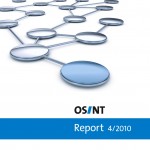
ISN OSINT Report 4/2010
In this year’s final OSINT Report Florian Schaurer and Jan Störger examine the prevalent classification and safeguarding procedures in place for sensitive national security information. They provide a synopsis of definitions, and cast light on the complex interplay between officially required secrecy and publicly desired transparency.
The report also addresses the implications of over-classification on the one hand, and authorized or unauthorized disclosures (‘leaks’) of classified information on the other, raising awareness in the interest of more balanced governmental information security and sharing.
Please find previous ISN OSINT Reports here.


